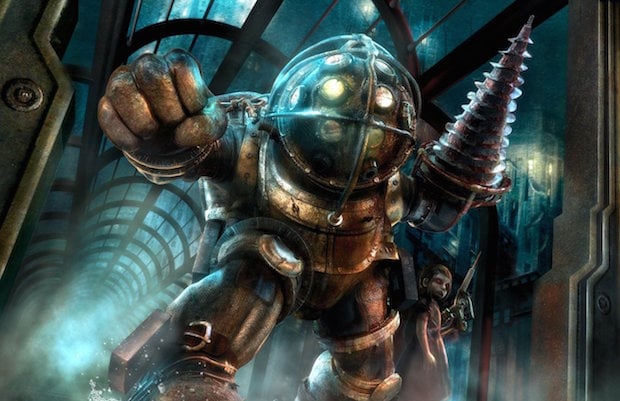Movies
The Troubled History of the Cancelled ‘BioShock’ Movie

The BioShock games from developer 2K (later Irrational Games) and creator Ken Levine are considered to be among the best titles of this millennium, each one garnering countless awards and reigniting the “Are video games art?” discussion with each release. They sold millions of copies and ignited the imagination of players and designers, culminating in games that are to this day highly replayable and thoroughly entertaining.
The first game followed a man who stumbles across the underwater city of Rapture after a plane crash in the middle of the ocean. As this character, Jack, makes his way through the paradise-turned-dystopian wasteland, the story twists and turns and the player is taken through one of the most amazing and shocking journeys in video game history. The second followed a Big Daddy as he made his way through Rapture eight years after the events of the original game. The third entry, BioShock Infinite, escaped the depths of the ocean and instead ventured into the sky where Booker DeWitt must rescue Elizabeth and fight his way through a civil war raging through Columbia, the floating city.
Less than a year after the first game’s release – but after it had received endless praise and seemingly countless awards – it was announced by Take Two, who owns 2K, that they had entered a partnership with Universal Studios to adapt the title into a feature length film. The plan was to have the film be written by John Logan (Gladiator, The Last Samurai, Sweeney Todd: The Demon Barber of Fleet Street) and directed by Gore Verbinski (The Ring, Pirates of the Caribbean) with a tentative release date of 2010. However, a project of this scope quickly saw the budget rise to questionable numbers, giving the studio pause. After all, the majority of video game-to-film adaptations are not exactly the biggest box office earners.
Taking a quick tangent, video game films had, up to that point, been largely unsuccessful when it came to box office returns. Super Mario Bros., which was based on one of the most popular titles in video game history, failed to make even half of its budget. Double Dragon failed to crack $3 million. Street Fighter and Mortal Kombat both did well but adaptations like Wing Commander, Final Fantasy: The Spirits Within, and Doom all failed to meet expectations. It must also be remembered that theaters keep a good percentage of ticket sales and also that marketing costs are not factored into the film’s production budget. As a result, it might seem like a $50 million movie that makes $150 million is hugely successful but the reality is that it might have only just broken even. Considering all of this, it’s easy to see why there was a concern at the studio for BioShock as the costs would’ve been very high.
In 2009, Verbinski, who was working on the CG animated film Rango, dropped out of the film due to conflicts. 28 Weeks Later director Juan Carlos Fresnadillo stepped into Verbinski’s shoes, allowing the previous director the chance to move into a producer role. In early 2010, it seemed like the movie was on the right track. Fresnadillo was in pre-production for the film with Braden Lynch, who was a voice actor for the second game. But by summer that year, the budgetary concerns were back, even though Verbinski was trying to smooth things over and assure people that it would happen. He also made it clear to EuroGamer that the film would be a “hard R”.
During an August 2010 interview with Big O and Dukes, Ken Levine affirmed that the movie was still a priority. “I will say that it is still an active thing and it’s something we are actively talking about and actively working on.”
Then, in early 2011, the final nails started to get hammered into the coffin of a BioShock movie when it came out that the intent to make an R-rated adaptation was one of the big reasons why the film wasn’t getting made. And in November of that year, Levine spoke to Industry Game (via Geek Tyrant) and explained that they’d rather not make the movie than make something that was rushed:
We got very close to having it get made – we had a deal in place and a director. But for us there’s no burning [desire] to have a movie made just to get it made. For us and for Take-Two, it’s really got to be something that will a) give the fans something that they want, and b) for those who don’t know BioShock, really introduce them to something that is consistent with the game, and is it going to be a good representation of the game. There are differences between games and movies, no doubt, but the movie has to draw from the same DNA in terms of the world and the story beats. But you know, we don’t have a need to get it made.
Fast forward to 2012 and Fresnadillo affirmed that he had exited the project, stating that it was up to the studio and the developer to reach a consensus. “To be honest, by now, I’m completely out of that, and developing other stuff. Right now it’s on hold. The studio and the videogame company, they have to reach some kind of agreement about the budget and the rating,” he explained.
The official word that the film had been cancelled came from Levine in March of 2013 when he spoke with EuroGamer, telling them that he ended the movie deal. He explained what was wanted and where things went wrong, specifically mentioning the ballooning budget as a source of issues.
There was a deal in place, and it was in production at Universal – Gore Verbinski was directing it. My theory is that Gore wanted to make a hard R film – which is like a 17/18 plus, where you can have blood and naked girls. Well, I don’t think he wanted naked girls. But he wanted a lot of blood.
Then Watchmen came out, and it didn’t do well for whatever reason. The studio then got cold feet about making an R rated $200 million film, and they said what if it was a $80 million film – and Gore didn’t want to make a $80 million film. They brought another director in, and I didn’t really see the match there – and 2K’s one of these companies that puts a lot of creative trust in people. So they said if you want to kill it, kill it. And I killed it.
It was saying I don’t need to compromise – how many times in life do you not need to compromise? It comes along so rarely, but I had the world, the world existed and I didn’t want to see it done in a way that I didn’t think was right. It may happen one day, who knows, but it’d have to be the right combination of people.
The last we heard from the movie was in early 2014 when unused artwork for the film was uploaded to artist Jim Martin’s website, which you can see below.
Alas, BioShock is yet another film that lands in the dreaded territory of “Development Hell”. As technology advances and visual FX become cheaper while increasing in quality and consistency, a dive into Rapture might not be out of the question. But for now, this saga has sunk to the deepest, darkest depths of the ocean.
Now, would you kindly let us know in the comments who you’d love to see tackle a BioShock adaptation? Y’know, should it ever happen.

Movies
‘The Invisible Man 2’ – Elisabeth Moss Says the Sequel Is Closer Than Ever to Happening

Universal has been having a hell of a time getting their Universal Monsters brand back on a better path in the wake of the Dark Universe collapsing, with four movies thus far released in the years since The Mummy attempted to get that interconnected universe off the ground.
First was Leigh Whannell’s The Invisible Man, to date the only post-Mummy hit for the Universal Monsters, followed by The Last Voyage of the Demeter, Renfield, and now Abigail. The latter three films have attempted to bring Dracula back to the screen in fresh ways, but both Demeter and Renfield severely underperformed at the box office. And while Abigail is a far better vampire movie than those two, it’s unfortunately also struggling to turn a profit.
Where does the Universal Monsters brand go from here? The good news is that Universal and Blumhouse have once again enlisted the help of Leigh Whannell for their upcoming Wolf Man reboot, which is howling its way into theaters in January 2025. This is good news, of course, because Whannell’s Invisible Man was the best – and certainly most profitable – of the post-Dark Universe movies that Universal has been able to conjure up. The film ended its worldwide run with $144 million back in 2020, a massive win considering the $7 million budget.
Given the film was such a success, you may wondering why The Invisible Man 2 hasn’t come along in these past four years. But the wait for that sequel may be coming to an end.
Speaking with the Happy Sad Confused podcast this week, The Invisible Man star Elisabeth Moss notes that she feels “very good” about the sequel’s development at this point in time.
“Blumhouse and my production company [Love & Squalor Pictures]… we are closer than we have ever been to cracking it,” Moss updates this week. “And I feel very good about it.”
She adds, “We are very much intent on continuing that story.”
At the end of the 2020 movie, Elisabeth Moss’s heroine Cecilia Kass uses her stalker’s high-tech invisibility suit to kill him, now in possession of the technology that ruined her life.
Stay tuned for more on The Invisible Man 2 as we learn it.
[Related] Power Corrupts: Universal Monsters Classic ‘The Invisible Man’ at 90
























You must be logged in to post a comment.